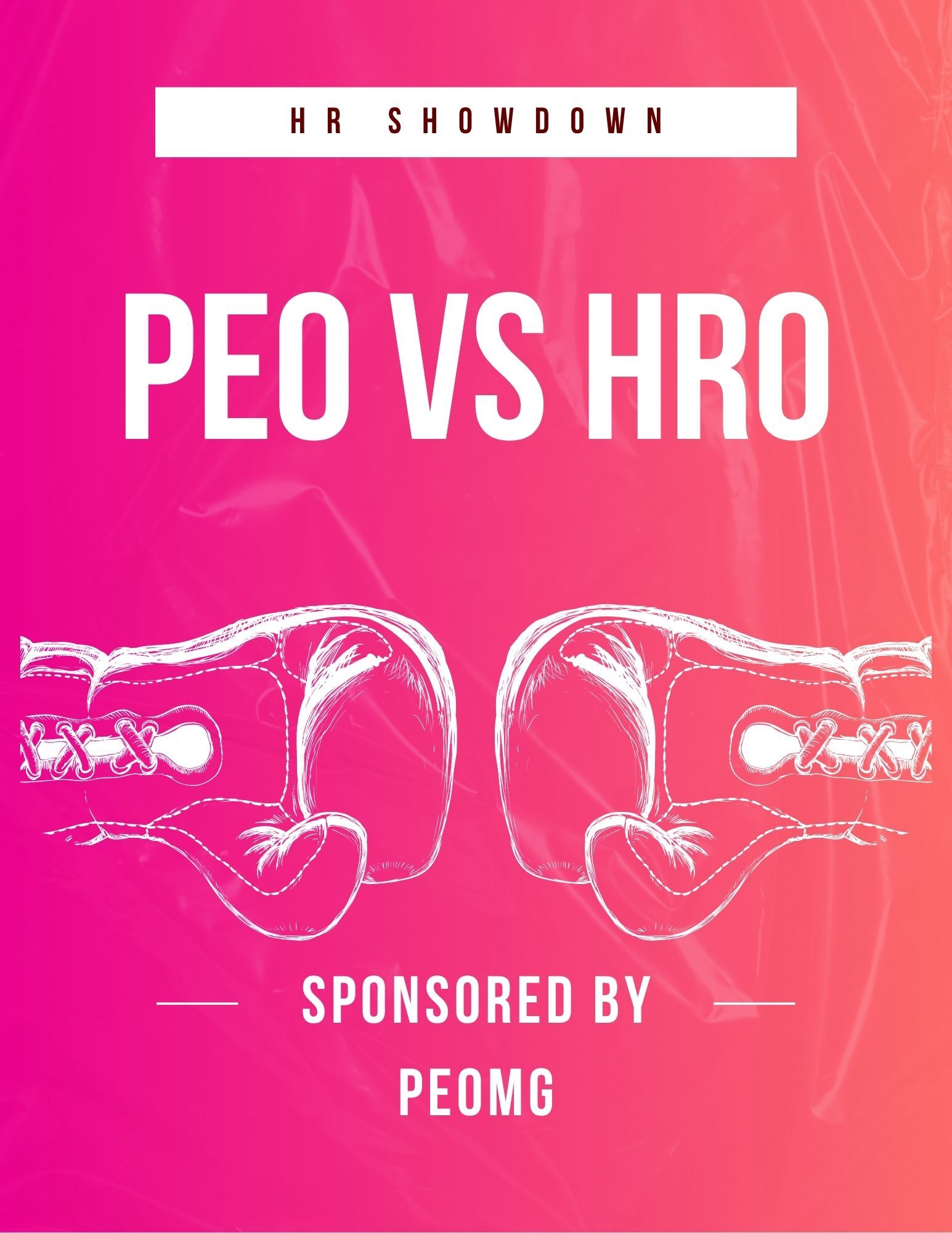HR Unlocked: The Full Spectrum of PEOs and the Services They Offer
In the realm of small to medium-sized businesses, managing human resources (HR) effectively is not just an operational necessity, it's a strategic...
8 min read
 Austin Gentry
:
Updated on January 23, 2026
Austin Gentry
:
Updated on January 23, 2026

Wondering whether a PEO or an HRO is the best fit for your business? In this article, Professional Employer Organizations and Human Resources Outsourcing are compared in a detailed discussion of PEO vs HRO to help you decide which one meets your HR needs more effectively.
PEOs act as co-employers, offering comprehensive HR services like payroll and compliance, while HROs function as independent contractors, providing specific HR services without co-employment.
Selecting between a PEO and HRO involves assessing business size, HR needs, and control preferences, with PEOs generally benefiting smaller firms and HROs proving advantageous for businesses with existing HR departments.
PEOs provide extensive employee benefits and compliance support but may limit control, whereas HROs offer flexibility and cost efficiency, allowing businesses to tailor HR services without influencing company culture.
To make an informed decision about hr outsourcing services, it’s important to understand the business models of PEO and HRO. PEO stands for Professional Employer Organization, while HRO stands for Human Resources Outsourcing. The primary distinction lies in their operational models: a PEO acts as a co-employer, sharing employment responsibilities with the client company, whereas an HRO functions as an independent contractor, offering specific HR services without co-employment.
Small and medium-sized businesses frequently struggle with HR tasks due to limited resources. Medium-sized businesses can benefit from PEO and HRO services that provide tailored solutions to address their specific needs.
A certified professional employer organization (PEO) is a full-service HR outsourcing company that manages various HR tasks, employee benefits, and PEO services.
Through the co-employment model, a PEO acts as a co-employer, handling specific HR functions while the client company retains operational control under a contractual agreement.
This partnership allows businesses to focus on their core activities while the professional employer organization takes care of:
Payroll administration
Employee benefits management
Compliance support
Employee benefits administration
Training
Manage payroll
PEO companies are particularly beneficial for small and mid-sized businesses that lack dedicated HR staff. Partnering with a certified PEO allows businesses to access sophisticated HR administration that were previously unattainable. Such an approach enables businesses to attract top talent and maintain competitive benefits packages.
Human Resources Outsourcing (HRO) involves hiring a third-party service provider to handle specific HR functions without establishing a co-employment relationship. Unlike PEOs, HROs do not co-employ staff, which allows businesses to maintain greater control over their workforce while outsourcing specific HR tasks. Additionally, human resource management can be streamlined through these hr outsourcing services.
HROs provide a range of services, including consultancy, software solutions, recruitment, and employee development. This flexibility makes HROs attractive for companies with existing HR team members that need additional expertise or support in specific areas.
When considering human resources outsourcing, understanding the key differences between PEO vs. HRO is essential. Such differences significantly impact how HR functions are delivered within a business. PEOs and HROs have distinct business models and service offerings that cater to different types of companies.
Each model, from co-employment to cost structures and employee benefits, offers unique advantages and potential drawbacks. These differences will guide you in making a decision tailored to your business needs.
A PEO arrangement involves sharing employment liabilities through a co-employment model. This model allows PEOs to provide comprehensive HR solutions, including payroll, benefits administration, and compliance. However, this co-employment relationship can influence company culture as the PEO provides strategic guidance and may impact HR practices.
Conversely, HROs function as independent contractors, offering specific HR services without a co-employment relationship. This allows the employer to retain full liability for payroll tax responsibilities and other employment-related obligations. The clear distinction between the service provider and the client helps maintain the company’s autonomy.
Both PEOs and HROs handle essential HR functions like payroll and benefits management. PEOs often offer a comprehensive suite of services, including claims administration, post-accident drug testing, accident investigation, and employee safety training as part of their risk management services. They also assist with regulatory compliance, which is cost-effective for companies with fewer than 100 employees.
In contrast, HRO services can vary widely and often focus on specific HR expertise areas. HROs provide access to knowledgeable HR professionals, helping organizations stay compliant with current regulations. Additionally, using HR software solutions can reduce inefficiencies and inaccuracies from internal data transfers.
PEOs generally charge higher fees compared to HROs due to the broad range of services and responsibilities they assume. PEOs usually have a pricing structure that includes a flat fee per employee. Alternatively, they might charge a percentage of the monthly payroll, which can range from 2% to 12%. This comprehensive approach can lead to significant cost savings for businesses, particularly startups, with extensive HR needs.
HROs, on the other hand, are more cost-efficient, providing a pricing model that includes a flat monthly rate plus a per-employee fee or project-based pricing. This allows businesses to outsource specific tasks rather than entire HR departments, providing greater budget control and potential long-term cost savings.
PEOs offer extensive employee benefits as part of their HR solutions through a co-employment model. This arrangement enables PEOs to leverage their status to negotiate more favorable insurance rates, thereby providing employees with access to more comprehensive workers' compensation coverage. This can lead to increased employee satisfaction and potentially lower turnover rates.
HROs enable clients to customize their insurance plan types. They can also choose different insurance carriers that align with their specific business needs. While HROs may not offer as comprehensive benefits as PEOs, they provide flexibility in service selection, allowing businesses to tailor benefits packages to their specific requirements.
PEOs provide a range of advantages, including access to premium employee benefits, significant cost savings, and comprehensive HR solutions. Businesses that engage with PEOs often experience faster growth rates and reduced likelihood of failure.
However, there are potential drawbacks, such as the loss of control over certain HR aspects. Understanding these pros and cons can help businesses determine if a PEO is the right fit for their HR needs.
PEOs enable small businesses to access sophisticated HR solutions and compete with larger organizations. PEOs significantly reduce administrative burdens by managing all aspects of human resource functions, including payroll, compliance, and benefits, through administrative services organizations. This enables businesses to concentrate more on core activities and strategic growth initiatives.
Additionally, PEOs offer substantial cost savings by reducing overhead costs associated with onsite HR staff and avoiding fixed expenses. Such an approach enables businesses to attract top talent and maintain competitive benefits packages.
PEOs offer valuable compliance support, enabling businesses to remain compliant with evolving labor laws and federal regulations. This support includes providing information and guidance on state employer compliance, which can enhance a company’s operational stability.
Partnering with a PEO helps businesses avoid penalties and stay compliant with all regulatory requirements. This makes PEOs a valuable partner for businesses looking to enhance their compliance efforts.
While PEOs offer many benefits, there are potential drawbacks to consider. Business owners may struggle with control over company aspects when outsourcing HR tasks to a PEO. Additionally, businesses may experience a lack of personalized service, as PEOs cater to multiple clients.
Evaluating these factors helps businesses determine if a PEO fits their HR needs.
HROs offer several advantages, including flexibility in service selection and cost efficiency. HROs offer a customizable approach, allowing businesses to tailor HR administration to their specific needs and adapt to changing requirements. However, there are potential disadvantages, such as the loss of direct oversight over HR functions and concerns about data security.
Understanding these pros and cons helps businesses determine if an HRO is a suitable fit for their HR needs.
HROs allow businesses to tailor their HR services to specific needs, providing a flexible approach that can adapt to changing business requirements. Organizations using HROs retain complete employment control while choosing services.
HROs’ flexibility in service selection allows businesses to customize their HR strategies as needs change over time. This makes HROs attractive for businesses seeking adaptable HR solutions.
HROs can lead to substantial cost savings for businesses that have an internal HR team. Flexible service selection enables the strengthening of weaknesses without incurring unnecessary costs.
Cost savings and budget control make HROs compelling for businesses aiming to enhance cost efficiency. This allows businesses to outsource specific HR tasks while retaining control over their core HR functions.
One notable advantage of HROs is their limited impact on company culture compared to PEOs. Functioning as third-party providers, HROs have minimal influence on a company’s internal dynamics.
It may be a benefit that HROs do not influence company culture, but this also comes with the risk of dealing with another third party that is not well integrated into your company.
The great debate of PEO vs. HRO requires careful consideration of HR needs, business size, structure, and long-term objectives. Both models offer unique benefits and potential drawbacks, so it’s important to assess which one aligns best with your organization’s requirements. By understanding the specific HR functions you need to outsource and the level of control you wish to retain, you can make an informed decision that supports your business’s growth and operational efficiency.
The extent of HR needs, budget constraints, and long-term scalability should influence your decision-making process. Whether you opt for the comprehensive support of a PEO or the tailored flexibility of an HRO, ensuring that your HR outsourcing partner aligns with your strategic goals is essential.
Identifying specific HR activities to outsource is the first step in determining whether a PEO or HRO suits your business. Small businesses with up to 50 employees can benefit significantly from a PEO managing payroll, compliance, and employee benefits. This enables the business to focus on its core competencies while relying on the PEO for essential HR and business functions.
Conversely, businesses with existing HR departments might benefit from the flexibility of an HRO. By selecting only the necessary services, businesses can tailor their hr outsourcing options to meet specific needs while retaining control over certain hr functions and human resource functions. This ensures HR tasks are managed efficiently without overcommitting resources.
The size and structure of your business significantly influence the choice between a PEO and an HRO. Small to mid-sized companies, particularly those with 10 to 50 or more employees, typically benefit from the comprehensive services offered by PEOs. These businesses often lack the internal HR expertise and resources to manage all HR functions effectively, making a PEO an ideal solution.
For larger businesses or those with established company’s hr departments, an HRO may be a more suitable option. HROs allow these companies to outsource specific HR functions while maintaining control over core operations. Such flexibility allows businesses to adapt HR strategies to changing needs without compromising control or efficiency.
When making the choice of PEO vs. HRO, it’s essential to consider how your HR needs may evolve over time. Leading HR outsourcing solutions offer scalability, enabling businesses to add or upgrade services as they grow. This ensures that your HR outsourcing partner can support your long-term business strategies and operational efficiency.
Aligning HR services with long-term goals enhances your company’s competitiveness and adaptability. By choosing a scalable and flexible HR outsourcing solution, you can ensure that your business remains well-equipped to handle future challenges and opportunities.
Choosing between a PEO and an HRO involves evaluating your business’s unique needs, size, and long-term goals. PEOs offer comprehensive HR solutions and significant cost savings, making them ideal for small to mid-sized businesses. In contrast, HROs provide flexibility in service selection and cost efficiency, catering to businesses with established HR departments.
By understanding the key differences between PEOs and HROs, businesses can make informed decisions that align with their strategic objectives. Whether you choose a PEO or an HRO, ensuring that your HR outsourcing partner aligns with your business’s needs is crucial for long-term success.
The main difference between a PEO and an HRO is that a Professional Employer Organization serves as a co-employer, sharing employment responsibilities with the client, whereas a Human Resource Outsourcing company operates as an independent contractor that provides specific HR services. The primary distinction in the question of PEO vs. HRO is their structure, scope of services provided, and cost.
PEOs benefit small businesses by offering essential HR services such as payroll, benefits administration, and compliance support, enabling them to concentrate on their core activities while achieving substantial cost savings.
Large enterprises can indeed benefit from HROs by outsourcing specific HR functions while retaining control over core operations, thus achieving enhanced scalability and flexibility. This approach allows for improved efficiency and resource allocation.
Choosing a PEO typically incurs higher fees for more comprehensive services, whereas HROs often have lower fees due to their focus on enabling businesses to outsource specific functions. PEOs offer robust solutions for extensive HR needs, while HROs offer narrow solutions for specific HR needs.
PEOs support compliance by offering information and guidance on state and federal regulations, ensuring businesses remain up-to-date with evolving labor laws and avoid potential penalties.

In the realm of small to medium-sized businesses, managing human resources (HR) effectively is not just an operational necessity, it's a strategic...

In the ever-shifting business world, the rise of Professional Employer Organizations (PEOs) stands out to me as particularly intriguing. It's not...

Partnering with a Professional Employer Organization (PEO) can transform your business operations, but careful consideration is required. From...